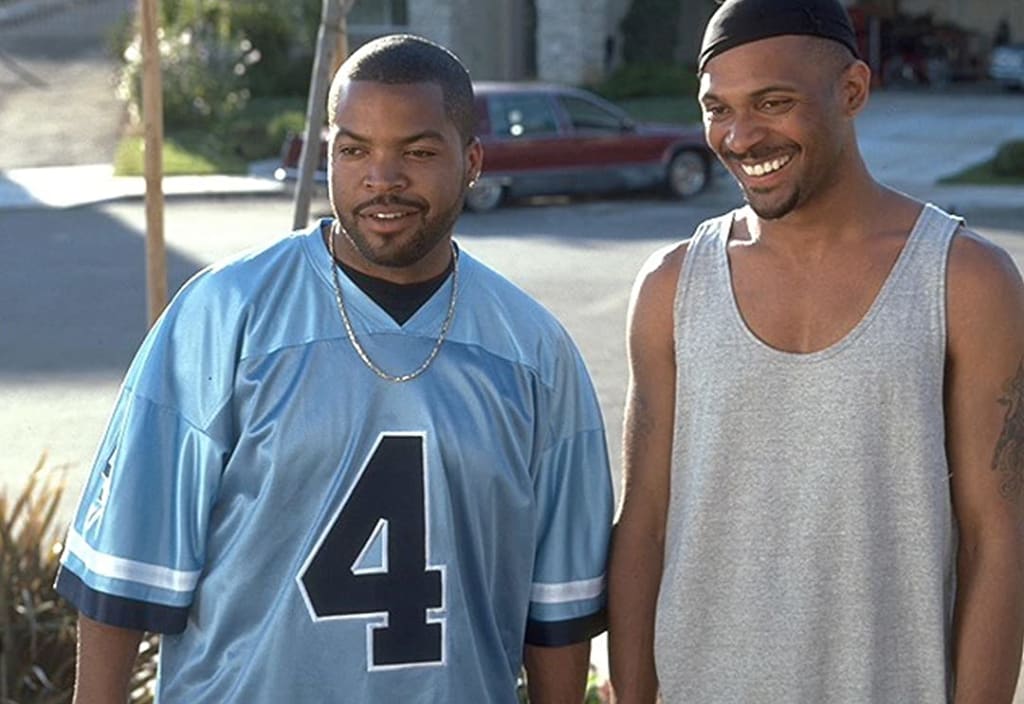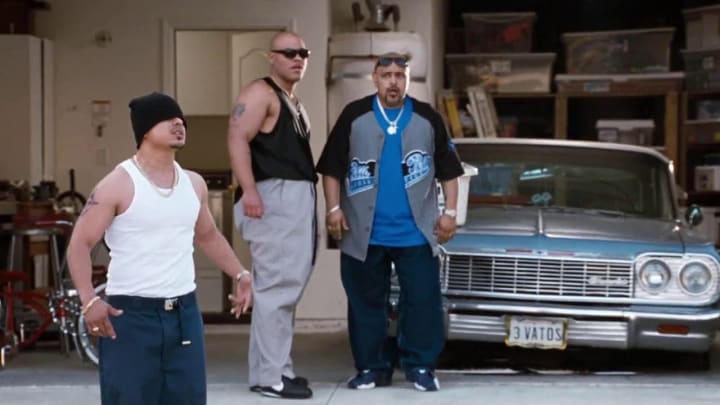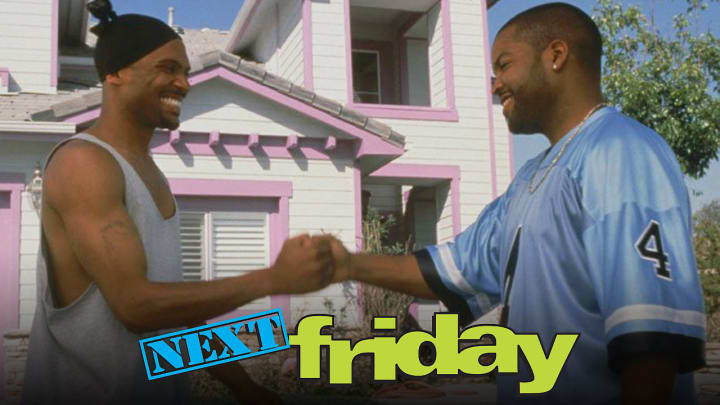The 2000's Movie Project: 'Next Friday' Film Form at the Dawn of the New Millennium
Next Friday was the first wide release American theatrical film of the year 2000.

History records that Next Friday, written, produced and starring the prolific Hollywood mogul Ice Cube was the first new movie released in American cinemas in the new millennium. Next Friday arrived in theaters on Friday, January 12th of 2000. Hollywood's first statement on a new millennium of the art form that is film is a cash grab sequel of dubious, even suspect, quality.
Next Friday begins jarringly by breaking the fourth wall. Two, unseen characters, presumably Ice Cube and co-star Mike Epps, or perhaps co-writer DJ Pooh, begin talking over the opening credits. The two are smoking weed and the smoke is forming the words of the credits which these two unseen characters comment upon. The duo drift into character and out of character as we hear references to Ice Cube while the voice of Ice Cube pokes fun as if he were not Ice Cube. The other character does most of the talking, mocking the director, mocking Ice Cube and claiming to have also co-written the film, which is why I thought that the person speaking could be co-writer DJ Pooh, whose credit is onscreen at that moment.
But if the character pretending not to be Ice Cube is then not Ice Cube then why would he be interacting with the real DJ Pooh? It’s confusing, jarring and not particularly funny. This opening lacks any sort of purpose other than establishing that marijuana is, perhaps, an important aspect of Next Friday. Weed was also a prominent part of the film that preceded Next Friday, simply called Friday, released in 1995.
This fourth wall breaking, off-screen dialogue was part of the very first new nationwide release film of this young century. Hollywood’s first statement to the world for the year 2000, a new millennium, is two unknown characters smoking weed and mocking the artifice of film. They are mocking the very existence of movies themselves while in a movie. The filmmakers likely weren’t aware that they were engaging in anything groundbreaking or unusual and they aren't; not intentionally. It's just a strange way to begin a movie that is also an unintended milestone in film history, the first movie of a new millennium, the 21st century.
I am writing this article as I watch Next Friday and the surrealism is unrelenting. I am less than 2 minutes into the movie and I have had to pause twice to examine the unique choices that the filmmakers have made for this movie. After that fourth wall busting opening credits, voice-over from Ice Cube, in character now, we presume, as Craig, narrating what life has been like since the end of his previous adventure.
So, just to reset, we’ve gone from a non-diegetic, audio from outside of the reality of the story, to a more or less diegetic, audio within the movie reality, more or less, in a matter of seconds. You don’t have to have a degree in film studies to understand how jarring this is. The fourth wall has been carelessly dashed in the first seconds of the movie and is followed instantly by the hackneyed cliches of expository narration.
What a strange way to kick off the new millennium.
As a refresher, at the end of 1995’s Friday, Craig had punched the neighborhood bully, Debo (Tiny Lister), in the face and knocked him out cold in a moment of triumph. The narration of Next Friday wants us to know however, that what happened previously, was not the end of that story. Debo was not defeated and Craig’s life, forever changed by standing up to his bully, is still playing out under the specter of danger from Debo.
That’s the intention, the actual dialogue however, is jarring in the way it posits the film reality. Having been preceded by that confounding credits sequence, with barely a beat to gather itself, the opening narration starts like this “In the movies, when you beat up the neighborhood bully, you're supposed to live happily ever after.” Movie narration that is intended as internal dialogue of the main character in the movie is now mocking the notion of movie tropes as if it were not in a movie.
I am literally 1 minute and 36 seconds into Next Friday and I am pretty sure I am going to need to score some weed in order to cope with the utterly confounding film-making decisions.. I’ve never used marijuana before, but the hallucinatory effect of the drug surely must aid in the comprehension of the conflicting notions of reality and filmed reality in Next Friday. It’s either that or allow madness to overtake me.
Oooofffff!
The comedy and dialogue of Next Friday is so tin-eared and tortured that I am definitely beginning to long for the sweet release of ganja to take the pain away. I am 7 minutes in now, and between narration and dialogue, the movie has ex-posited away Chris Tucker’s Smokey, he’s away at rehab, and Craig’s sister, the memorable and greatly missed, Regina King, she moved out of her parents house.
The dialogue is so forced and clumsy it’s a wonder it can be delivered with such relaxed grace as Ice Cube gives it. To his credit, as hackneyed as this painful set up to the narrative is, Cube appears completely at ease. That’s also because he doesn’t have to do any of the undignified physical comedy of this opening sequence. The late, great comedian John Withersoon, as Craig’s father, Willy, is stuck with the deranged comic heavy lifting.
After we are forced to watch, quite graphically, as a dog poops on Craig’s lawn, Witherspoon forcefully pantomimes his way into falling on the leavings and then wearing them for the remainder of his screen time. Why? Because poop smells and that’s funny? You know what else is alleged to be funny? Old people sex, which Ice Cube apparently finds hilarious as his script has Witherspoon rant on and on about being naked with Craig's mom.
Can I get the number for a good dispensary? I live in Illinois. It's legal here.
Throughout the dog poop scene, there are these insane editing cuts to the newly escaped from prison Debo. I’ve written columns throughout my career about visual film-making and the importance of establishing shots and the weight the camera gives to objects just by focusing on those items. That is far from the only kind of establishing that the camera and editing are responsible for.
In order to create a visual relationship between characters, editing and camerawork are required to establish where characters are in relation to one another. Take, for instance, Debo in Next Friday. Debo is hiding somewhere in Craig’s neighborhood, it’s established via dialogue and editing that Debo can see Craig’s father and is awaiting the chance to see Craig so that he can enact revenge on him for the actions of the previous movie.
Unfortunately, it appears that director Steve Carr failed to get the necessary camera coverage to establish where Debo is in relation to Craig’s home. Debo is seen seated next to his younger brother and fellow escapee. The two are chained together from prison. The two characters are hiding between a pair of hedges next to a home in Craig’s neighborhood. Via editing and reaction shots, it’s apparent that Debo and his brother can clearly see Craig’s father slip and fall in the dog poop.
However, because there is no established eye line between Debo and Craig’s front lawn, he appears at an angle where it would be impossible to see Craig’s father or the dog poop on the lawn. Debo's also angrily screaming and abusing his brother in a fashion not suited for remaining hidden. It’s not something that an average moviegoer is going to notice on a conscious level. The filmmakers are hoping that you will be laughing so heartily at the dog poop gag that you won’t notice that Debo and his brother have superhuman extreme vision powers to see around corners, up a minor incline and in great detail.
This is less than 10 minutes into Next Friday.

I’m going to stop now. I’ve spent nearly 1300 words on the first 10 minutes of Next Friday and frankly, the rest of Next Friday, isn’t nearly as interesting or noteworthy. The remainder of Next Friday is an adequately amiable stoner comedy in which Craig helps his Uncle (Don D.C Curry) and Cousin, Day Day (Mike Eppss) keep their suburban mansion by stealing money from their neighbors, Mexican drug dealers so offensive in their stereotypical posing that the parody of their existence is whirling 360 of problematic elements.

Next Friday was the first statement Hollywood made in the new millennium. When scholars look back at the state of the American film business at the dawn of the new millennium, they will be confronted with an astonishingly confused, problematic, melange of awful film-making, reductive stereotypes, comedy centered on animal abuse, and hackneyed slapstick.
What does Next Friday say about the world of American film at the turn of a new millennium?
The poor quality of Next Friday almost feels as if Hollywood were being reset to the early 1900's where bumbling filmmakers often relied on wacky physical shtick, pantomime and a bit with a dog, to cover for the exploration of a medium they had yet to master. Nearly a century later, and film-makers are still learning and exploring the form with sometimes shocking results.
Whatever Next Friday says about movies at the turn of the century, it’s not good. It’s apt that we begin with a sequel as franchise films will dominate the next 20 years of Hollywood at the movies. From a commercial perspective, it reflects how business concerns trump art. Next Friday was only created to capitalize on previous success, like countless films that came after it. And, the only reason Next Friday ends up becoming the first new movie of the year 2000 is because there was no other competition in the marketplace at the time.

Next Friday is perhaps a signal toward the soulless product era of Hollywood. An era where Hollywood was no longer hanging on to the pretense that movies are about creating art and are not merely a business aimed at creating profit in the most simplistic and efficient fashion. Such as taking a familiar intellectual property, throwing money at the creators to create more of the same product and calculating the ways in which to maximize profits.
Hey, what do you know, Next Friday was the appropriate choice for this milestone in film history after all.
About the Creator
Sean Patrick
Hello, my name is Sean Patrick He/Him, and I am a film critic and podcast host for the I Hate Critics Movie Review Podcast I am a voting member of the Critics Choice Association, the group behind the annual Critics Choice Awards.






Comments
There are no comments for this story
Be the first to respond and start the conversation.